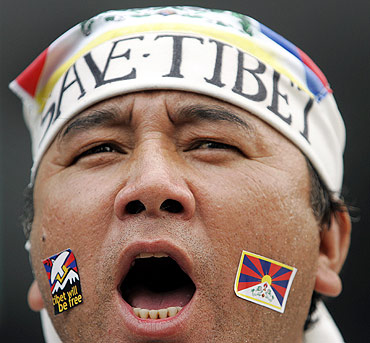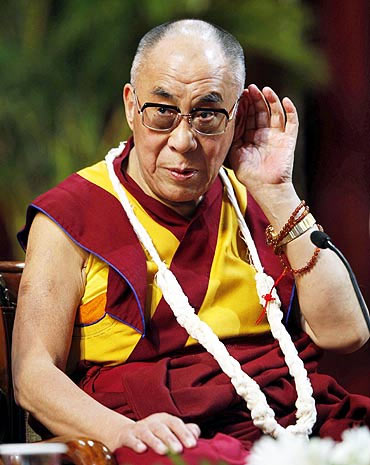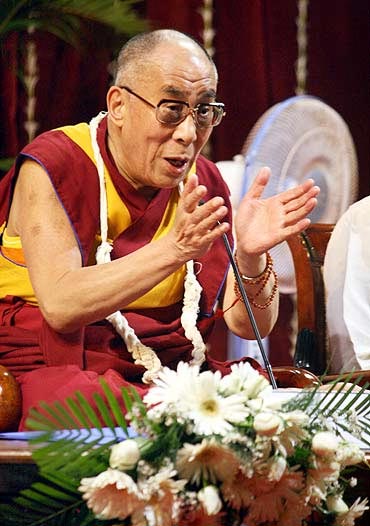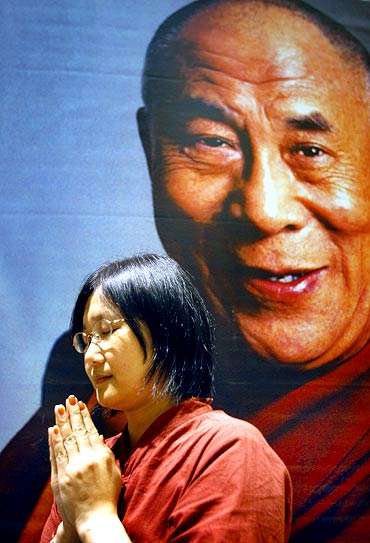This article was first published 14 years ago
Home »
News » Dalai Lama, a wolf in monk's robes: China
Dalai Lama, a wolf in monk's robes: China
Last updated on: March 7, 2011 19:03 IST
Image: The Dalai Lama
Photographs: Hitesh Harisinghani/Rediff.com
Ahead of the third anniversary of the riots in Tibet, China on Monday stepped up its attack against the Dalai Lama, vilifying him as a "wolf in monk's robes", "double-dealer" and a "secessionist chief" who is seeking separation of the region from the Communist nation.
"I had described him in those words after the March 14 riot in Lhasa in 2008 because I think he himself is a living Buddha but had done things beneath his status," said Chinese Communist Party chief of Tibet, Zhang Qingli said.
Zhang is a CPC official known for pursuing tough policies in Tibet and earlier in the Muslim Uyghur majority Xinjiang region, which also witnessed riots in 2009.
The Dalai Lama is a "wolf in monk's robes,"Zhang said, accusing him of seeking the separation of Tibet from China.
...
Image: A follower prays in front of a picture of the Dalai Lama
Photographs: Nicky Loh/Reuters
The renewed attack on the Dalai Lama came ahead of the third anniversary of the riots in Tibetan provincial capital Lhasa that left 18 people dead and nearly 400 wounded. The riots were attributed to the resentment of Tibetans against the increasing settlement of the mainland Chinese in the Tibetan region.
Zhang said it was the late Chinese Premier Zhou Enlai who first described the Dalai Lama as a "wolf in monk's robes" after China "foiled an armed rebellion staged" by him and his supporters in 1959.
The Dalai Lama then fled to India and created the self-declared "Tibetan government-in-exile", he said.
"I used Premier Zhou's words to say that I object to double-dealer and ensure a correct understanding of the fact," he said.
Zhang also made comparisons between the Dalai Lama and Rebiya Kadeer, a Uygur separatist and leader of the World Uygur Congress.
"Rebiya is a housewife who has used her illegal fortune to conduct secessionist activities. She has no influence among the public," he said.
"While Dalai is a secessionist chief who fools simple believers under the guise of religion," the state-run Xinhua quoted him as saying.

Image: A Tibetan activist shouts slogans during a rally in Taipei
Photographs: Pichi Chuang/Reuters
In January, Zhang told the State-run China Daily that fighting Tibetan Buddhist separatists was more difficult than the Uyghur militants of Xinjiang province due to a variety of reasons.
Xinjiang has more than 20,000 mosques but only 8,000 clerics, where as Tibet has fewer than 1,800 Tibetan-Buddhist temples but is home to more than 46,000 monks, making monks an integral part of Tibetan lifestyle.
Another Tibetan official, Qiangba Puncog, chairman of the Standing Committee of Tibet Autonomous Regional People's Congress asserted that 'the disease' of the Dalai Lama will not exert any impact on the overall situation of Tibet.
"Of course there will be little repercussion due to religious factors, but we will take that into consideration and will surely guarantee long-term political stability in Tibet," he said while attending the annual parliamentary session in Beijing.
"I dare not say that Tibet will not see any incidents, big or small, forever, but I dare say that the current situation in Tibet is on the whole stable, and the Tibetan people wish for stability and object to trouble-making," he said.

Padma Choling, chairman of the Tibet autonomous regional government, said the 76-year-old Dalai Lama cannot decide whether the "institution of reincarnation" might be abolished after his death.
"What he said does not count," he said, adding that Tibetan Buddhism has a history of more than 1,000 years, and the reincarnation institutions of the Dalai Lama and Panchen Lama (the second important monk in Tibet) have been carried on for several hundred years.
"We must respect the historical institutions and religious rituals of Tibetan Buddhism. I am afraid it is not up to anyone to abolish the reincarnation institution or not," he said.
Their tirade on the Dalai Lama came a day after Tibetan officials attending the Chinese legislature, the National People's Congress, met President Hu Jintao who said meticulous efforts must be paid to the tasks of reform, development, and stability to boost leapfrog development and maintain perennial stability in Tibet.
Source:
PTI© Copyright 2025 PTI. All rights reserved. Republication or redistribution of PTI content, including by framing or similar means, is expressly prohibited without the prior written consent.



